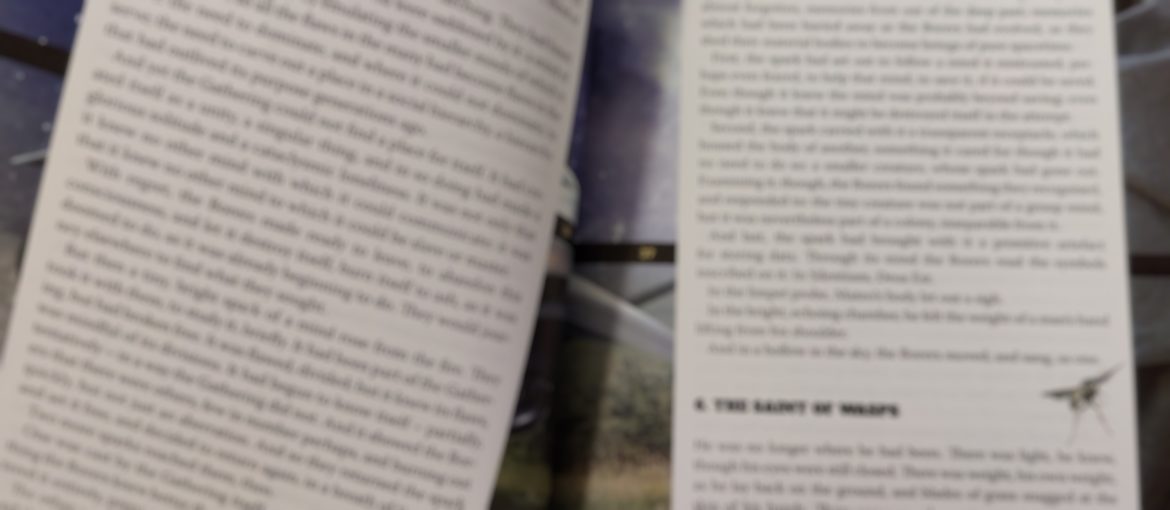Tim Lees, Night Town of Mars. A boy, not popular among his peers at school, has a fondness and respect for his uncle, an eccentric prone to expounding weird ideas and arguments. One Summer the boy insists that he go to stay with his uncle and aunt – it’s preferable to Scouts. Whilst there he learns of a crude plot by local worthies to un-home his uncle, who apparently is no more popular among his peers than the boy is among his. And at nights he begins to experience another place that is like but unlike his relatives’ home atop a hill, looking down upon the nearby town.
I’ve enjoyed Tim Lees’ work in the past but the only story of his I’ve read in the last few years, Soldiers Things, felt a little slight. This I enjoyed more: Lees has a knack for juxtaposing the strange and the homely, horror and humour, eccentricity and the banal. The scenes in the other world are a lot of fun and echo Alice in Wonderland (an over-used reference point, but hush for I rarely draw upon it) whilst the scenes in our reality are almost as fun. The ending drags on a little, but it works well enough.
Eugenia Triantafyllou, Those We Serve. A group of ‘artificials’ serve seasonal tourists at a beautiful island resort, but their status as artificials is a closely-guarded secret. The artificials are programmed never to reveal their nature – they experience pain and compulsions if an internal watchdog senses the possibility of revelation – and the secret has been kept for a long time. The artificials are copies of humans who, long ago, vanished beneath the seas to a hidden city. Our protagonist is one such artificial who loves – but perhaps cannot acknowledge this to himself – a woman he recognises both from the memories of the man he is based upon, and from his own memories of her annual visits to the island.
I really liked this story. It does a great job of presenting the churning conflict beneath icy calm for the protagonist, the probing questions of the tourist he loves and who, perhaps, recognises something of what he is and what his existence means. It is also evocative of the lives of those working in the hospitality sector – of exploitation and secrets and callousness behind the smiles that greet transient visitors.
John Possidente, The Transport of Bodies. Another returning Interzone writer, Possidente wrote Dead Man’s Coffee, which was previously reviewed on this blog. Er, I also found that story enjoyable but slight – a snapshot of a world, a vignette in a life. This story takes place in the same setting, perhaps featuring the same protagonist (I don’t remember and would need to check, but I believe both are freelance journalists). I think it functions a little better as a standalone, perhaps because it’s almost a self-contained murder mystery – although the mystery unfolds in a character’s monologue rather than under probing investigation. Of course, there’s always the chance there is more to a story…
Val Nolan, Make America Great Again. Nolan’s Cyberstar was a great lead story in another recent issue of Interzone. In contrast to that tale of a far future solar system and a religious cult’s bizarre plans, this is set in the ugly and violent today of America, with its resurgent fascism, vigilante violence toward protestors, and racist cops. It’s also about a WW2 soldier who disappeared and who returns, perplexed at how the Nazis he fought have also returned.
I’ll be honest: I was excited to read this story but it did not work for me. It engages with intense and vital events and issues, but doesn’t engage with any of the structural, material or socio-political conditions that underpin them. Rather, it engages with a mythic concept of what “makes America great” that I found banal, and is obsessed with the purity and heroism of mythic figures from the past, which I also found banal. Its climax also suggests that although things are bad there are mysterious aliens – parental figures, if you will – who are prepared to nudge events to ensure the ‘right’ timeline occurs. But maybe it’s all just a story. And maybe America is just a story. And maybe if you tell the right story, and get the right person into power, things will get better. For me, this produced a conclusion hopelessly out of touch with the dysfunction, decline and sadism of the contemporary USA.

